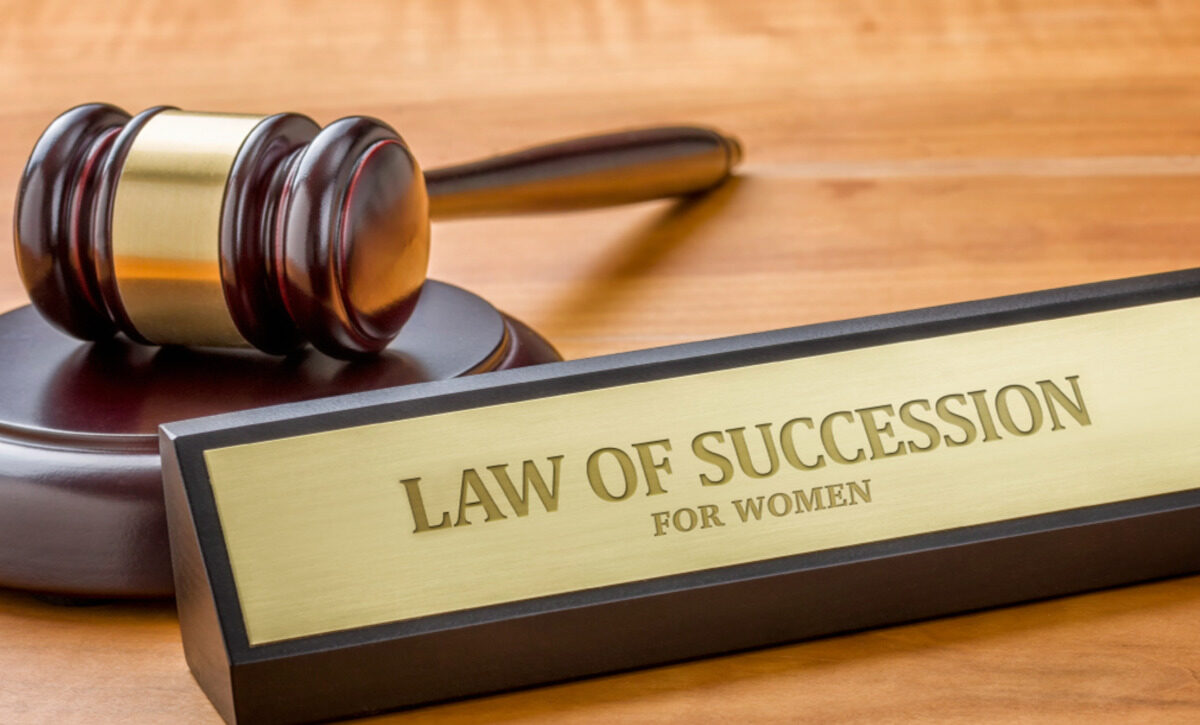Table of Content
▲In a patriarchal society, laws are based on gender, and historically, women have been subjected to discrimination under India's property and inheritance laws. After independence, things started to get better, and now they've become even better. Claims to property and succession in India are based on the claimants' religious convictions because the country lacks a unified civil code. However, women are regarded slightly differently under inheritance laws than men, regardless of their affiliation with a specific faith, group, or sect. Thanks to recent modifications in Hindu inheritance rules for women, daughters and wives can now breathe a sigh of relief. The Islamic Laws for Women are remain distinct and more stringent, despite some small updates in recent years that have no bearing on inheritance or property rights. Christian law is more permissive. But every religion has its own set of rules. In addition to the 1956 Hindu Succession Act, there are other laws as well. Following are the Muslim Personal Law Application Act of 1937 and the Indian Succession Act of 1925. In this context, they shall be referred to as Hindu Law, Muslim Law, and Christian Law. Hindu law applies to all religions, including Jains, Buddhists, and Sikhs. You might gain more insight on women's inheritance rights and inheritance laws by reading the article's conclusion.
To understand how property laws can impact the lives of women let us take the example of the below situation.
How Property Laws for Women Affect Their Living
Think about a scenario where Anita marries and moves in with her spouse in his office space. Her husband's parents-in-law maintain a separate residence that they built a few years ago. Anita's husband passes away after two years of marriage without leaving a Will or accumulating any property. Anita must leave the office apartment. They won't let her stay with her in-laws despite her request. She visits her parents, but her brother forbids her from staying with them. Anita's brother lives there with his family because her father passed away intestate (without leaving a Will). Now, where can Anita go? What does she possess that is hers?To find an answer to this situation, let us understand property laws for women in detail.

Property and Inheritance Laws for Women Under Hindu Law
Since ancient times, property laws for women have changed significantly. Even after gaining independence and establishing the laws, numerous modifications have brought women's rights in the patriarchy on par with those of men. Currently, Hindu women are subject to the following inheritance regulations.
Property Rights of Daughter
Like her siblings, a daughter is entitled to an equal part of the property owned by her parents (the mother and the father). She co-owns the ancestral property with her brothers and is liable for the same debts associated with it. If a married daughter is abandoned, widowed, or divorced, she may request maintenance or housing at her parents' home. A daughter has full ownership rights to any property or asset that is given to her in a will or by gift once she reaches adulthood.Property Rights of a Wife
A married woman has complete control over her personal property, which she is free to sell, give as gifts, or otherwise dispose of, in accordance with Hindu Succession Law. In the event of a HUF (Hindu Undivided Family), she is entitled to housing, support, and maintenance from her husband and his family. She receives the same portion as everyone else when her husband and her children divide the land. Additionally, in the event of her husband's passing, she would be entitled to an equal share of the assets that would otherwise be split among her, her children, and his mother.Property Rights of a Mother
As a Class I heir, a mother receives an equal portion of the assets left by her deceased son, together with his wife and children. A mother is entitled to an equal portion of the property as each of her children if the children divide the family asset following the father's passing. She has a right to maintenance and housing from her qualified children. She has complete control over her belongings and resources and is free to use them however she pleases. However, all of her children will inherit her possessions equally when she passes away.Property Rights of a Sister
Sisters who are Class II heirs—mother, wife, and children—can only inherit from their deceased brother if he had no Class I heirs.Property Rights of a Daughter-in-law
The rights of a daughter-in-law are severely restricted by the Hindu Succession Act's inheritance regulations for women. A daughter-in-law has no claim to the assets that her in-laws own, whether they were gained through inheritance or self-procurement. She can only obtain ownership of these assets through her husband's part of the inheritance.Property Rights of a Divorced Women
A divorced woman is entitled to maintenance and alimony but is not permitted to establish a claim against her ex-husband's assets. The husband is recognized as the owner if the property is registered in his name. If the property is co-owned, the wife must demonstrate her involvement in the purchase. According to women's property regulations, she would thus only be eligible for the share up to the amount she contributed to the aforementioned property. Whether or whether the man has remarried, the wife and children are entitled to their inheritance on the guy's property in the event of a separation without a legal divorce.Property Rights of a Remarried Widow
In case the widowed wife remarried, she was supposed to give up her claim on the ex-husband's property, according to the Hindu Widow Remarriage Act of 1856. However, taking Section 24 of the Hindu Succession Act of 1956, if the widow remains unmarried when the property distribution is discussed and marries much later, she owns her share of the property.
Property Rights of a Second Wife
Polygamy is prohibited by the Hindu Marriage Act of 1955, and a man is only allowed to have one legitimate wife at a time. So, a key consideration in this case is whether the second marriage was legal. The second wife is a Class I heir to the man's property if he marries again after the death of his first wife or following a legal divorce. If not, the second wife will not inherit the deceased man's property; but, her children from this marriage will.Property and Inheritance Laws for Women in Christian Law
Let's examine the inheritance laws for women in different types of relationships in light of Christian law, which also applies to Jews and Parsis.Property Rights of a Daughter
Along with her siblings, a daughter would receive an equal share of both of her parents' assets. Until she marries, she is given care and support by her parents. She is then her husband's responsibility to maintain. As long as she is a minor, her father will continue to be her natural guardian. She is fully entitled to her personal property now that she is a legal adult.Property Rights of a Wife
A woman is entitled to maintenance from her spouse as a wife. She has the right to seek for divorce on this ground if he refuses to give it. Christian women's inheritance rules state that a widow is only entitled to one-third of her husband's assets, with the remaining property being shared equally among the deceased's children. If there are no children, she receives half of the assets. The mark indicates that the wife must receive at least INR 5000 from her deceased husband.Property Rights of a Mother
Christian women's property laws do not regard mothers as being dependant on their offspring. A woman is not entitled to maintenance if she is a mother. However, the mother is entitled to one-fourth of the asset if the deceased child was not married and had no children. Women who are divorcees, widows who have remarried, or second wives continue to be subject to the same inheritance regulations as under Hindu law.Property and Inheritance Laws for Women Under Muslim / Islamic Law
This law follows the Sharia rule and has different specifications than the other faiths.
Property Rights of a Daughter
The faith holds that a woman is only worth half as much as a male. Daughters receive half of what sons receive under the inheritance laws in this country for women. However, a woman has total authority over her possessions and is free to manage, sell, gift, or dispose of them as she pleases. Daughters are entitled to live in their parents' homes up to marriage and after widowhood or divorce if they don't have any or only little children. It is the children's job to care for their mother once they are old enough to do so.Property Rights of a Wife
A married woman has complete ownership over her own assets and other items, according to Sharia property regulations for women. She has a right to support from her husband, the 'Mehr' sum agreed upon during the marriage, and any other reasonable arrangements she may need following the divorce. If she is the sole wife left after her husband passes away and there are no children in the marriage, she will receive one-fourth of his assets and one-eighth if there are. If the deceased husband had multiple wives, each wife's inheritance would be cut in half, or around one-sixteenth. A husband's will can enhance the wife's fortune to a certain level in the absence of additional sharers.Property Rights of a Mother
A mother who is widowed or divorced is entitled to support from her children as well as a one-sixth inheritance of the estate of her deceased child. Her own property is distributed in accordance with Islamic law. The 'Mehr' sum is given to a divorced woman in accordance with Islamic inheritance laws for women, after which she no longer belongs to her husband and his family. She is not the beneficiary of any assets left to her by a late ex-husband. The same is true for a widow who has remarried and is therefore not entitled to any property rights from her deceased husband. According to Islamic law, a second wife is a legitimate spouse with the same privileges as a first or third wife.Property and Inheritance Laws for Women in India: Maintenance
-
Wife-who is not able to take care to maintain herself
-
Does not take of legitimate or illegitimate minor children
-
Father or mother- unable to take care of themselves
Can Woman Criminals Claim Inheritance in the Property?
A person proven guilty of serious crimes will not inherit property as per Hindu Succession Act.
Lessons from other Countries: Inheritance Laws
Inheritance Laws for Tribal Woman
Let us discuss the inheritance laws for tribal women in India:-
-
In India, Scheduled Tribes (ST), be it inheritance, marriage or succession, are governed by customary laws
-
Property inheritance right is not covered under Hindu Succession Act 1965 or Indian Succession Act 1925
-
However, Supreme Court asked the government to re-examine the provision in the Hindu Succession Act.
-
According to Hindu Succession Act, a woman has an equal share in the property as male.
“When a daughter belonging to a non-tribal is entitled to the equal share in the property of the father, there is no reason to deny such right to the daughter of a tribal community. Female tribal is entitled to parity with male tribal in intestate succession,” the said Supreme Court.
The Final Word on Property Laws for Women
The amendments in the property laws for women and changes in the various judgements have brought some traces of legal rights to women. It is important that you know your legal rights under inheritance laws for women so that no one can deprive you of your possessions.
Also Read: Commercial property documents | Important documents to check before buying a commercial property





